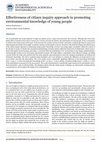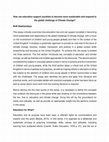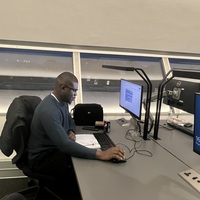Papers by Micheal Obakhavbaye

Academia Environmental Sciences and Sustainability, Sep 16, 2024
This study investigates the effectiveness of a citizen inquiry approach in enhancing young peopl... more This study investigates the effectiveness of a citizen inquiry approach in enhancing young people's knowledge of issues concerning single-use plastics within the context of the circular economy. It situates the conceptual underpinnings of citizen inquiry within the rhetoric of citizen science, fused with inquiry-based learning, and makes a concerted effort for participants to be co-researchers in the design, implementation, and knowledge creation. The study utilizes a quantitative data collection strategy, providing a pretest before the study and a protest after the study using the same instrument to assess the change in participants' procedural and declarative knowledge. The data is analyzed using descriptive and t-test statistics to evaluate the difference in means between test scores before and after the intervention. The results demonstrated a considerable improvement in the participants' procedural, declarative, and overall knowledge. The findings indicate that the citizen inquiry technique can democratize learning and the research process, but it requires design to be contextualized to the situations in which it is used.
This essay critically examines how education has and can support societies in becoming more susta... more This essay critically examines how education has and can support societies in becoming more sustainable and responding to the global challenge of climate change, with a focus on the involvement of children and young people globally and then in the context of the United Kingdom. It employs a systematic approach to provide an overview of the issue of climate change, theories, models, framework, and policies in a global context while streamlining and focusing on the United Kingdom. To achieve this, the essay is divided

This essay critically examines how education has and can support societies in becoming more susta... more This essay critically examines how education has and can support societies in becoming more sustainable and responding to the global challenge of climate change, with a focus on the involvement of children and young people globally and then in the context of the United Kingdom. It employs a systematic approach to provide an overview of the issue of climate change, theories, models, framework, and policies in a global context while streamlining and focusing on the United Kingdom. To achieve this, the essay is divided into three sections. The first section introduces key concepts of education and climate change, as well as theories and models appropriate for the discourse. The second section considered the subject in a broader global context in terms of policies and the involvement of children and young people, while the third section takes a critical look at the United Kingdom in terms of policies and practices, as well as ongoing efforts in education to bring the subject to the attention of children and young people in British communities to deal with the challenges. The essay also identifies the gains and gaps from literature and practical works, and it provides details with practical examples of what has been done as well as areas where more work from the existing literature is required. Before delving into the main points of this essay, it is necessary to define the concepts that underpin the discourse in this piece while also drawing on the connections between the two, that is, education and climate change. Doing this will lay the groundwork for clarity and criticality, as well as provide an appropriate insight into the sections covered in this essay. Education for What? Education and its purpose have been seen in different lights by commentators and experts over the years (Biesta, 2015). In one sense, it is regarded as a deliberate and systematic process of acquiring knowledge, skills, values, and attitudes, including learning from sustained efforts (Cremin, Public Education, 1976 p. 27), and the act of

Uploads
Papers by Micheal Obakhavbaye